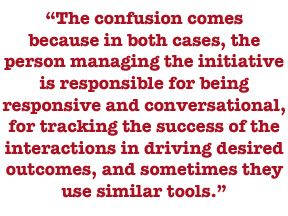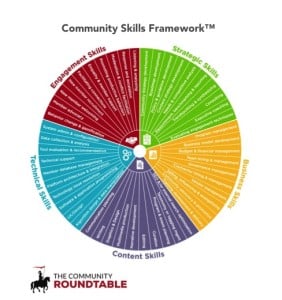By Rachel Happe, Principal and Co-Founder of TheCR
As someone who works with social media managers and community managers, it seems the line between the two types of positions is not terribly clear – and maybe doesn’t need to be – but I think it would be helpful to distinguish between the two. Why? Jim will often say that everyone is a community manager and he is right – everyone has a group of constituents which could be cultivated to drive better performance. However, not all companies want, need to, or can cultivate a community. I may see this differently than many and here is my take:
Community infers the following:
- Tight interlinking relationships between a significant percentage of members
- An acknowledgment of shared fate or purpose
- A potentially wide range of topics/conversations within that shared purpose
- A distributed leadership network – sometimes with a single leader, sometimes not
- A core membership that is relatively stable and active
Social media on the other hand infers the following:
- Socially- or conversationally- enabled content
- A loose network with the predominant structure being a hub and spoke model of interaction between an audience and the content creator
- Comment/response transactions
To me this means that communities and social media are good for different types of business outcomes.
In low complexity markets and use cases (think Sharpie pens) the focus is on social media because the relationships desired between Newell Rubbermaid and Sharpie customers does not need to be that deep – and the business model cannot support deep relationship development (i.e. spending hundreds on developing a relationship with a customer who buys $25 worth of products doesn’t make much sense). The goal is providing infrastructure and management that drives awareness and a sense of connection to the brand with tens of thousands or millions of customers. Furthermore, proactively connecting customers with other customers doesn’t do much for Newell Rubbermaid because customers don’t need deep references from other customers to make the decision to purchase or to use the product itself. This example is managed by someone who aggregates UGC, publishes content, and responds to people talking about Sharpie – either on the site itself or on a public social network.

Some common social media tools.
In high complexity markets or use cases, communities make more sense. If the decision-making process is
complex and long to reach a conversion, customers benefit greatly by interacting and building relationships with other customers – as well as getting introduced to affiliated product and service providers who can help them maximize their value. Adobe’s design tool communities are a good example of this – customers help each other maximize the use of the tool, creating better adoption and affiliation. Because the price point of the product is higher, the business model can support richer relationship development. These communities are managed by people who are connecting members to each other and to relevant content but may be doing very little content creation themselves.
The confusion comes because in both cases, the person managing the initiative is responsible for being responsive and conversational, for tracking the success of the interactions in driving desired outcomes, and sometimes they use similar tools.
I took a stab at articulating the primary responsibilities of social media managers and community managers.
Social Media Manager:
- Content Creation (Blogging/vlogging/podcasting) designed to spur conversation/viral sharing
- Responding to conversations about the brand and the content
- Ensuring input/feedback gets channeled to the appropriate internal functional group
- Curating and promoting UGC
- Managing tools – mostly social networks (Facebook, Twitter, LinkedIn, etc) and blogs
- Reporting/measurement

Not every community manager looks like this, but some do!
- Planning and developing strategies for increasing engagement and conversion
Community Manager:
- Welcoming members to the community & acclimating them
- Building relationships with key members of the community and influencers
- Moderating conversation and encouraging specific topics
- Promoting members, making introductions to other members, and encouraging relationship formation
- Running regular programming/content/events
- Finding internal resources to respond to specific community discussions and coordinating cross-functional needs
- Enforcing guidelines/boundaries
- Managing tools – might be a combination of enterprise & social networks (FB, Twitter, LinkedIn, etc)
- Reporting/measurement
- Channeling input and response from community into other organizational processes
- Planning and developing strategies for increasing engagement and conversion

Do you agree that there is a difference in these two roles and if so, do you agree with how I have differentiated them? Admittedly, there is a lot of overlap but I believe the intent and focus of each role is fairly unique. For companies looking to make a hire in this space, it is useful to understand whether they need primarily a content-oriented person or a relationship-oriented person.
If you’re looking for way to hone your community management skills check out the Community Careers and
Compensation research, our Community Skills Frameworks and more free community manager resources!
——————————————————————————————————————–
Need community management resources? Check out our online training courses, our community benchmarks and TheCR Network – a private community for community pros.
